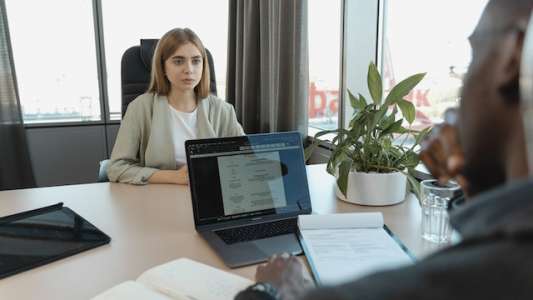Problem-solving questions are common in interviews - you may be asked specific questions related to the job you’ve applied for or about your approach and methodology to solving them.
This useful guide will help you get prepared for common problem-solving questions in your next interview with advice on how to answer them.
1. What are some of the most difficult problems you have solved?
When interviewers ask “What are some of the most difficult problems you have solved,” they usually want to know two things:
- The types of difficult problems you have solved and
- How you coped with or overcame these difficulties.
To answer this question effectively, first, take a few moments to think about and jot down the types of difficult problems you have faced in your work. Then, for each problem, briefly describe the steps you took to solve it. Be sure to highlight a few key learnings or lessons that you took away from overcoming these difficulties.
Some examples of difficult problems that job seekers have solved include:
- Being assigned a project with an impossible deadline
- Having to manage a team member who was not meeting expectations
- Having to come up with an innovative solution to a long-standing problem
2. How do you go about solving problems?
When you are asked how you go about solving problems during an interview, focus on what works for you specifically - there is no one ‘right’ way to solve problems, so don’t try to fit yourself into that mold.
You should have a clear process and some examples to help support your answer.
Remember to keep it positive - interviews are about selling yourself and your skills, so make sure your answer reflects that.
3. Describe the result of a recent problem you solved
For this question, the interviewer is looking to understand the impact you’ve had on solving problems and how important the problems you’ve described are. The bigger the impact the better the example.
4. Give an example of a time when you had to think outside the box to solve a problem.
When answering this question, it’s important to provide a specific example of a time when you had to think outside the box to solve a problem. Avoid generalities or platitudes like “I’m a creative person” or “I always look for new and innovative ways to solve problems.”
Instead, focus on describing a concrete situation where you were faced with a difficult problem and had to come up with an original solution. Be sure to describe the steps you took to solve the problem and what resulted from your efforts.
If you can illustrate that you can think creatively and come up with innovative solutions, you’ll be sure to impress potential employers and set yourself apart from other candidates.
5. What is a time when you went above and beyond to solve a problem?
Be prepared to answer this question with a great story.
Think of a time when you were faced with a difficult situation at work. Maybe there was a big project that needed to be completed or a customer that was particularly challenging. Whatever the situation was, make sure it’s something that you were able to successfully overcome.
Next, describe what steps you took to solve the problem. Did you come up with an innovative solution? Did you put in extra hours to make sure the job got done? Was it a team effort? Whatever it was that you did, be sure to highlight your role in the story.
Lastly, include details of the results and how they impacted others.
6. Tell me about a time when you predicted a problem before it occurred?
This question shows the interviewer your proactiveness and vigilance.
Try to think about a time when you were able to identify a potential issue and take steps to prevent it from happening. It may be a problem that you had anticipated occurring - how did you know it would happen? What would have been the impact if it did?
Showing that you have the ability to think ahead and predict problems before they occur is a strong skill for any potential employee to have, and by providing specific examples of your own experience, you can demonstrate that you possess it.
7. Give an example of a time when you had to use your creativity to solve a problem
When interviewers ask this question, they are looking to see if you have the ability to come up with new and innovative solutions to problems. They want to know if you are able to think outside the box and come up with creative solutions that others may not have thought of.
To answer this well you should:
- Give an example of a time when you had to use your creativity to solve a problem.
- Explain how you were able to come up with a creative solution and what the outcome was.
- Be sure to highlight any challenges that you faced and how you overcame them.
8. How do you know when to solve a problem on your own or to ask for help?
There’s no single answer to this question, as the best course of action will vary depending on the situation. However, here are a few general tips to keep in mind:
First, try to assess the difficulty of the problem and whether you have the necessary skills and knowledge to solve it. If it’s a simple issue that you’re confident you can handle, then go ahead and take care of it yourself.
However, if the problem is more complex or outside of your area of expertise, then it’s probably best to seek out help from someone who knows more about it.
9. How do you know when a problem is solved?
This is a great opportunity to show off your critical thinking skills.
First, take a step back and assess the situation. What are the goals that need to be accomplished? What does “solved” look like? What are the constraints that you’re working within?
Defining success criteria will ultimately determine when the problem is solved.
10. Do you enjoy problem-solving?
Almost all roles require some form of problem-solving. A strategic “yes” is always recommended when answering this question.
If you have experience solving problems in previous roles, be sure to mention that. This will show the interviewer that you have the ability to handle challenges.
For example, you might say something like: “I actually enjoy problem-solving quite a lot. There’s something satisfying about being able to find a solution to something that was once a mystery. One time, I was able to help my team solve a big issue we were having with our website. We were able to identify the problem and put together a plan to fix it.”
This response shows that you not only have the ability to solve problems but that you also enjoy doing so. It also gives the interviewer a specific example of a time when you were successful in this area.


